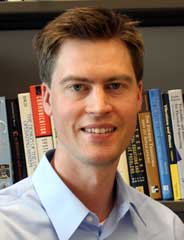CV: Dr. Philip Beatty
A scientist in physical sciences and the Odette Cancer Research Program at Sunnybrook Research Institute sits down to answer a few questions from Alisa Kim.
Bio basics: A scientist in physical sciences and the Odette Cancer Research Program at Sunnybrook Research Institute (SRI). Born in Richmond, Virginia. Grew up in Winnipeg, Manitoba; Los Angeles, California; and Toronto, Ontario. Completed his PhD in electrical engineering at Stanford University. Worked as a scientist at GE Healthcare before coming to SRI.
What is your area of research?
I'm really focused on the use of MRI (magnetic resonance imaging) for breast cancer screening in high-risk women. Magnetic resonance is typically used for patients that we know are sick. It's a very expensive test but has very high value. As we look at an application like screening, where there are much greater volumes [of patients], we have to look at being efficient. There are opportunities for early health and providing better health care.
Can you tell me about some of the things you've designed?
I've worked on image reconstruction algorithms-software that takes the data from the scanner and creates images from it. One of the things that's come along in the last decade is parallel imaging: multiple receiver channels that enable us to image faster, but it requires much more sophistication in how that data is processed. At GE, I did a lot of work developing parallel imaging algorithms, and I've done a lot of work on improving image quality.
What drew you to Sunnybrook Research Institute?
What attracted me to SRI first and foremost is the imaging group (now the physical sciences group). If you walk down this hall, there are world-class scientists and researchers who are also very approachable. They're very good at playing as a team. I think that's important as the solutions that are required in health care become more sophisticated. It's important to be part of an integrated team with different expertise. There's a great flow of ideas between the researchers. The other thing was being part of a hospital. Being tied to clinical care is really important for doing research in this area. Also, the facilities are phenomenal.
What have you learned from being an inventor?
The devil is in the details. Take Apple, for example. Were they the first to make a smart phone, tablet computer or MP3 music player? No. But they took those ideas and did a really good job implementing them. Microsoft was doing tablet computers for many years before the iPad came along and they weren't successful. Was the idea bad? Or did it need the right time, the right technology? All those details can make something successful. Also, if an idea doesn't work out, that doesn't necessarily mean it's a bad idea. Maybe it needs a better implementation.
What do you like to do outside of work?
Science is one of those things where there's always something chugging away in the background of one's brain. I have a two-year old and my wife also works, so when we're not working we like to spend as much time together as a family as we can.






